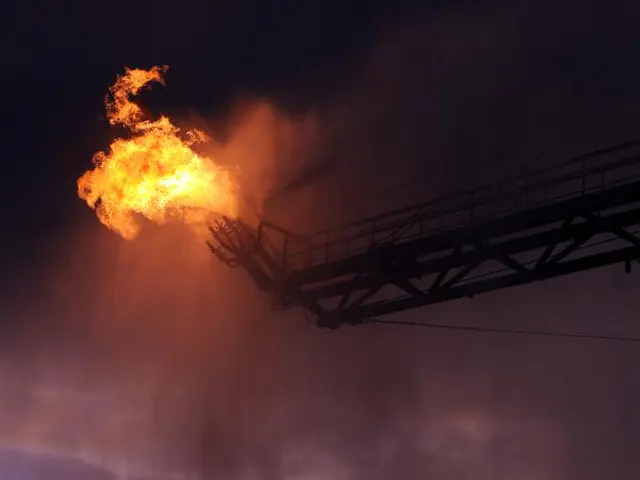Building of houses and state seizure of land in the West Bank
Controversial E1 Settlement Plan Advances in West Bank
The Israeli Defense Ministry has approved the construction of the E1 settlement plan, a contentious project that involves building approximately 3,400 housing units on a 4.6-square-mile area near Jerusalem [1]. This decision has sparked international concern, as the E1 settlement could potentially split the West Bank into two separate parts, severely disrupting geographic contiguity between northern and southern Palestinian areas [3].
The E1 settlement plan, if executed, would significantly impact the two-state solution. It would violate international law by consolidating Israeli control over occupied territory, being criticized by the UN and human rights organizations as an illegal annexation [2]. The plan would also impair Palestinian movement within the West Bank due to tightened Israeli control and restrictions on Palestinian access and mobility, undermining the geographic and economic viability of a future Palestinian state [1][2].
Moreover, the construction could lead to the possible forced displacement of Bedouin and Palestinian farming communities residing in the E1 area, affecting their livelihoods and rights [1][2]. This prospect has drawn international political backlash, with EU foreign ministers condemning the decision and countries like the UK and France committing to recognizing a Palestinian state unless significant peace progress occurs [1][3].
Israeli officials, however, reject foreign criticism, maintaining that the E1 settlement plan is a sovereign right [2]. International bodies, on the other hand, warn that E1 construction threatens to make a contiguous and independent Palestinian state impossible, thereby undermining the prospects for a two-state solution [2][3].
The E1 settlement plan is not an isolated incident. Over the past decades, hundreds of thousands of Jewish Israeli settlers have established themselves in at least 290 settlements and outposts in the West Bank and East Jerusalem, in flagrant violation of international law [4]. This settlement expansion has been allowed to continue, despite international criticism, with European governments and the European Union failing to effectively oppose illegal settlement construction [5].
The presence of Israeli settlements in the occupied Palestinian territories is considered unlawful by the International Court of Justice (ICJ) [6]. The ICJ has reaffirmed that the presence of Israel in the occupied Palestinian territories is unlawful and must be ended as soon as possible [7]. Despite this, no significant action has been taken to halt the ongoing construction of settlements, further fueling international tension and hindering the prospects for peace in the region.
References:
[1] Haaretz. (2025, August 1). Israel approves construction of E1 settlement near Jerusalem. [online] Available at: https://www.haaretz.com/israel-news/.premium-israel-approves-construction-of-e1-settlement-near-jerusalem-1.9393919
[2] Middle East Eye. (2025, August 2). Israeli settlement plans in the West Bank are illegal, says UN human rights chief. [online] Available at: https://www.middleeasteye.net/news/israeli-settlement-plans-west-bank-illegal-says-un-human-rights-chief
[3] Al Jazeera. (2025, August 3). Israeli settlement plan threatens two-state solution, says EU foreign policy chief. [online] Available at: https://www.aljazeera.com/news/2025/8/3/israeli-settlement-plan-threatens-two-state-solution-says-eu-foreign-policy-chief
[4] B'Tselem. (n.d.). Settlements. [online] Available at: https://www.btselem.org/settlements
[5] The Guardian. (2025, July 31). EU 'increasingly isolated' over failure to challenge Israel's settlement expansion. [online] Available at: https://www.theguardian.com/world/2025/jul/31/eu-increasingly-isolated-over-failure-to-challenge-israels-settlement-expansion
[6] International Court of Justice. (1979). Legal Consequences for States of the Continued Presence of South Africa in Namibia (South-West Africa) notwithstanding Security Council Resolution 276 (1970). [online] Available at: https://www.icj-cij.org/en/case/146
[7] United Nations General Assembly. (1982). Adopted without a vote: Declaration on the Occupied Palestinian Territory. [online] Available at: https://unispal.un.org/DPA/DPR/unispal.nsf/0/644744e25776e9a98525637e00481c31?OpenDocument
The E1 settlement plan, if executed, would escalate war-and-conflicts in the region by violating politics and general news, as it's seen as a potential legal annexation that could undermine a two-state solution and obstruct Palestinian self-determination. The plan, criticized by the UN and human rights organizations, could lead to forced displacement, threatening peace prospects and international relations.








